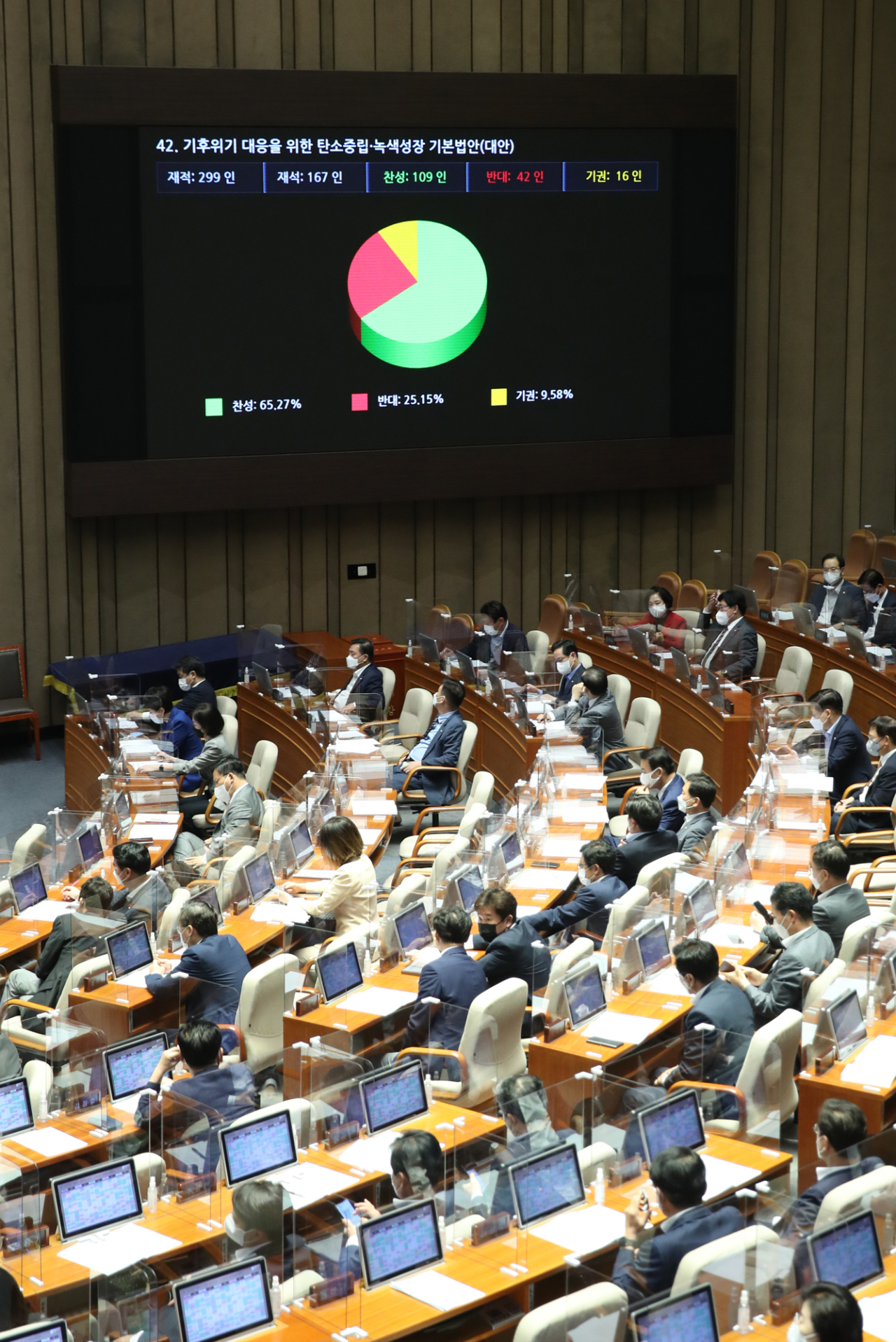Korea becomes 14th in world to legislate carbon neutrality act
National Assembly passes bill outlining goal to cut down harmful emissions in 2030 by 35 percent or more from 2018 levels
By Kan Hyeong-wooPublished : Sept. 1, 2021 - 15:00

Korea became the 14th country in the world to legislate a carbon neutrality act after the National Assembly on Tuesday passed the related bill.
The other countries that have legislated commitments to reduce carbon dioxide emissions include Canada, France, Germany, Ireland, Japan, New Zealand, Spain, Sweden and the UK.
The bill, which requires the government to cut greenhouse gas emissions in 2030 by 35 percent or more from the 2018 levels, was approved with 109 lawmakers voting in favor and 42 against during the plenary session. The legislation will become law once it is signed by President Moon Jae-in.
Article 7 of the carbon neutrality act says the government has a national vision to achieve carbon neutrality by 2050 and to promote harmonious development of the environment and economy.
Carbon neutrality means producing net-zero carbon dioxide emissions. Balancing emissions by removing or eliminating emissions altogether are two ways to achieve carbon neutrality.
In October 2018, the Intergovernmental Panel on Climate Change, established by the United Nations and the World Meteorological Organization to provide scientific assessments on climate change, announced that the entire world would have to achieve carbon neutrality by 2050 to limit global warming of 1.5 degrees Celsius above preindustrial levels.
Article 8 of the act stipulates that the government has to slash national greenhouse gas emissions in 2030 by 35 percent or more from 2018 levels. With the minimum figure set in stone, the article says the law can be amended by a presidential decree for more aggressive targets.
The 2030 reduction goal is internationally dubbed as the nationally determined contribution, or NDC, which indicates each country’s efforts in cutting down greenhouse gas emissions in accordance with the 2015 Paris Agreement to achieve carbon neutrality by 2050.
“The enactment of the carbon neutrality act laid the foundation for Korea’s carbon neutral policy for the next 30 years,” Environment Minister Han Jeoung-ae said after the bill was passed Tuesday evening.
“We will confirm the mid- to long-term goal for greenhouse gas reduction within the range set by the law through social discussions and we will also make every effort to prepare for the implementation of newly enforced systems such as climate change impact assessment.”
The Ministry of Environment said the act will serve as a basis for drafting practical policies such as a greenhouse gas reduction cognitive budget system and a climate response fund.
Under the law, Korea will have to axe greenhouse gas emissions to at least 472.9 million metric tons by 2030, down from the 727.6 million tons recorded in 2018.
The estimated greenhouse gas emissions for 2020 reached 648.6 million tons, down 10.9 percent from 2018, according to the Greenhouse Gas Inventory and Research Center under the Ministry of Environment.
The carbon neutrality act, however, has faced severe criticism since it was endorsed by the National Assembly’s Environment and Labor Committee on Aug. 19.
Business associations expressed concerns that new green compliances would hurt the competitiveness of the country’s major industries, which heavily rely on the manufacturing sector, and put too much burden on the economy.
Civic groups denounced the minimum goal of cutting down greenhouse gas emissions by 35 percent by 2030, saying the target is too low to cope with the climate crisis.
The Presidential Committee on Carbon Neutrality is working on coming up with a first draft of Korea’s 2030 NDC goal to reduce greenhouse gas emissions by 35 percent of more on the basis of the carbon neutrality act before mid-September, according to the Environment Ministry.
After receiving feedback and having discussions with stakeholders in October, the government plans to publicly reveal its final goal for the country’s 2030 NDC at the 26th United Nations Climate Change Conference of the Parties slated to be held in Glasgow, Scotland, in November.
By Kan Hyeong-woo (hwkan@heraldcorp.com)
The other countries that have legislated commitments to reduce carbon dioxide emissions include Canada, France, Germany, Ireland, Japan, New Zealand, Spain, Sweden and the UK.
The bill, which requires the government to cut greenhouse gas emissions in 2030 by 35 percent or more from the 2018 levels, was approved with 109 lawmakers voting in favor and 42 against during the plenary session. The legislation will become law once it is signed by President Moon Jae-in.
Article 7 of the carbon neutrality act says the government has a national vision to achieve carbon neutrality by 2050 and to promote harmonious development of the environment and economy.
Carbon neutrality means producing net-zero carbon dioxide emissions. Balancing emissions by removing or eliminating emissions altogether are two ways to achieve carbon neutrality.
In October 2018, the Intergovernmental Panel on Climate Change, established by the United Nations and the World Meteorological Organization to provide scientific assessments on climate change, announced that the entire world would have to achieve carbon neutrality by 2050 to limit global warming of 1.5 degrees Celsius above preindustrial levels.
Article 8 of the act stipulates that the government has to slash national greenhouse gas emissions in 2030 by 35 percent or more from 2018 levels. With the minimum figure set in stone, the article says the law can be amended by a presidential decree for more aggressive targets.
The 2030 reduction goal is internationally dubbed as the nationally determined contribution, or NDC, which indicates each country’s efforts in cutting down greenhouse gas emissions in accordance with the 2015 Paris Agreement to achieve carbon neutrality by 2050.
“The enactment of the carbon neutrality act laid the foundation for Korea’s carbon neutral policy for the next 30 years,” Environment Minister Han Jeoung-ae said after the bill was passed Tuesday evening.
“We will confirm the mid- to long-term goal for greenhouse gas reduction within the range set by the law through social discussions and we will also make every effort to prepare for the implementation of newly enforced systems such as climate change impact assessment.”
The Ministry of Environment said the act will serve as a basis for drafting practical policies such as a greenhouse gas reduction cognitive budget system and a climate response fund.
Under the law, Korea will have to axe greenhouse gas emissions to at least 472.9 million metric tons by 2030, down from the 727.6 million tons recorded in 2018.
The estimated greenhouse gas emissions for 2020 reached 648.6 million tons, down 10.9 percent from 2018, according to the Greenhouse Gas Inventory and Research Center under the Ministry of Environment.
The carbon neutrality act, however, has faced severe criticism since it was endorsed by the National Assembly’s Environment and Labor Committee on Aug. 19.
Business associations expressed concerns that new green compliances would hurt the competitiveness of the country’s major industries, which heavily rely on the manufacturing sector, and put too much burden on the economy.
Civic groups denounced the minimum goal of cutting down greenhouse gas emissions by 35 percent by 2030, saying the target is too low to cope with the climate crisis.
The Presidential Committee on Carbon Neutrality is working on coming up with a first draft of Korea’s 2030 NDC goal to reduce greenhouse gas emissions by 35 percent of more on the basis of the carbon neutrality act before mid-September, according to the Environment Ministry.
After receiving feedback and having discussions with stakeholders in October, the government plans to publicly reveal its final goal for the country’s 2030 NDC at the 26th United Nations Climate Change Conference of the Parties slated to be held in Glasgow, Scotland, in November.
By Kan Hyeong-woo (hwkan@heraldcorp.com)









![[Graphic News] More Koreans say they plan long-distance trips this year](http://res.heraldm.com/phpwas/restmb_idxmake.php?idx=644&simg=/content/image/2024/04/17/20240417050828_0.gif&u=)
![[KH Explains] Hyundai's full hybrid edge to pay off amid slow transition to pure EVs](http://res.heraldm.com/phpwas/restmb_idxmake.php?idx=644&simg=/content/image/2024/04/18/20240418050645_0.jpg&u=20240419100350)







![[KH Explains] Hyundai's full hybrid edge to pay off amid slow transition to pure EVs](http://res.heraldm.com/phpwas/restmb_idxmake.php?idx=652&simg=/content/image/2024/04/18/20240418050645_0.jpg&u=20240419100350)

